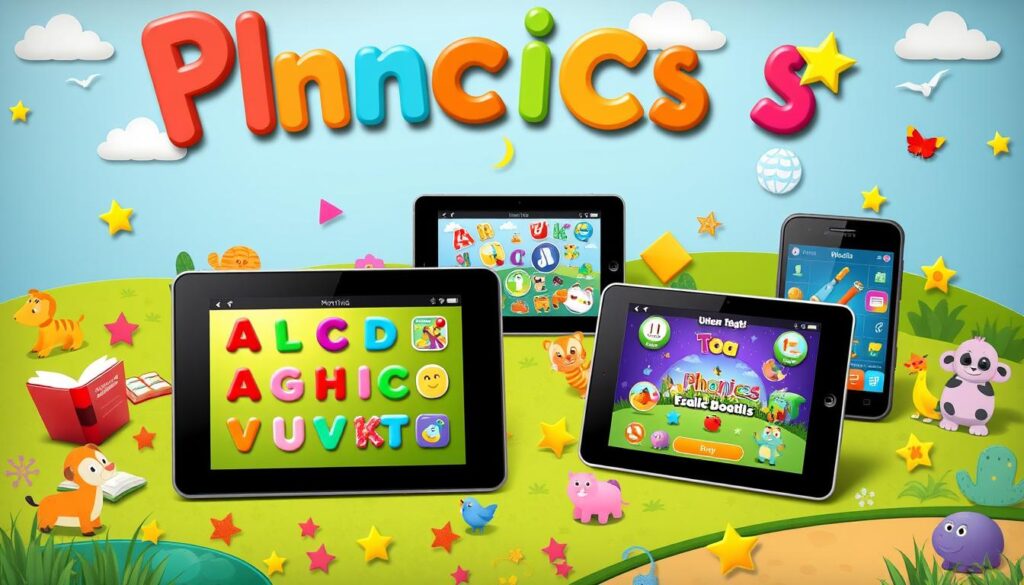Did you know that over 80% of children in the United States now have access to a smartphone or tablet? This shows how digital technology is becoming a big part of young learners’ lives. Educational apps for kids have changed how children learn and discover the world.
These apps are interactive and fun, covering many subjects. They help with early reading and math, science, and even creativity. With technology, educational apps for kids, educational games for toddlers, learning apps for preschoolers, and brain training games for children make learning enjoyable and tailored to each child’s interests.
Key Takeaways (Educational Apps for Kids)
- Educational apps for kids provide interactive and engaging learning experiences.
- These apps cover a wide range of subjects, from early literacy to science and creativity.
- The use of technology in learning makes it fun and personalized for each child.
- Parents can find the perfect educational tools to support their child’s development.
- Educational apps for kids foster a lifelong love of learning.
Engaging Interactive Storybooks for Young Minds
In today’s digital world, interactive storybooks are a great way for kids to dive into literature. These apps make stories come alive with bright pictures, animations, and fun activities. Kids get to join in and make the story their own.
These books not only entertain but also help with early reading skills. They improve vocabulary, understanding, and make reading fun.
Unleashing the Power of Imagination
Interactive storybooks spark kids‘ creativity and imagination. As they go through the digital pages, they get to touch, swipe, and discover different parts of the story. Features like moving characters and sound effects make the story come alive.
This makes kids want to dive deep into the story, shaping their own adventure.
Fostering Early Literacy Skills (Educational Apps for Kids)
Interactive storybooks for children do more than just entertain. They help with early reading skills like vocabulary and understanding. These apps are perfect for different ages and interests.
Parents can find art and creativity apps for children that make reading fun and engaging for their kids.
Phonics and Reading Apps: Building a Solid Foundation
In today’s world, phonics and reading apps are key tools for kids to learn early reading skills. These apps use fun games and activities to help kids learn phonics, letter recognition, and building words.
They teach kids how sounds and letters connect, which is crucial for reading well. Parents can pick from many apps that fit their child’s learning style and level. This ensures kids get the right support to read confidently.
Here are some main benefits of using these apps:
- Interactive and immersive learning experiences that keep children engaged and motivated
- Personalized feedback and progress tracking to help children identify and overcome areas of difficulty
- Adaptable difficulty levels that grow with the child’s evolving skills
- Opportunities to practice essential skills, such as letter-sound associations, word recognition, and phonemic awareness
There are many great phonics and reading apps out there. Parents can easily find the best ones for their child’s needs and likes. This helps lay a strong foundation for a lifetime of reading.

Educational Apps for Kids: Exploring the World of Math and Science
Educational apps for kids make learning math and science fun and interactive. They turn numbers into games and activities that kids love. This helps kids get better at solving problems, understand numbers, and grasp math concepts.
Math Skills Apps: Making Numbers Fun
These apps make math exciting by offering new ways to learn arithmetic, geometry, and algebra. Kids can solve puzzles and play games with numbers. This makes learning math not only fun but also builds confidence and a love for the subject.
Science Exploration Apps: Igniting Curiosity
Science apps spark kids’ curiosity by letting them explore the natural world. They can experiment with science, watch nature, and learn about coding basics. These apps help kids think critically, observe closely, and get excited about the world. They prepare kids for success in STEM subjects.